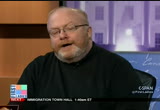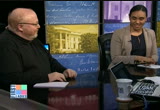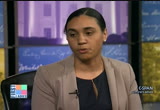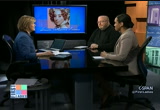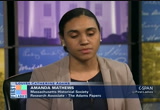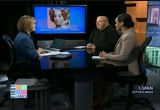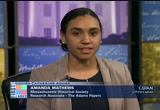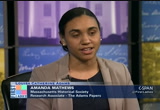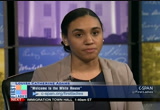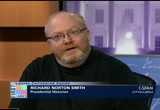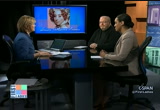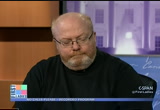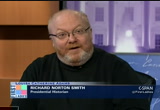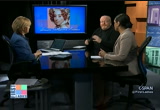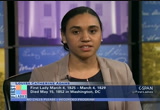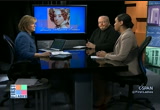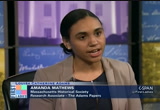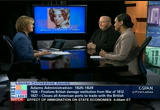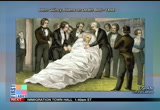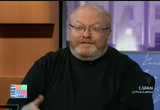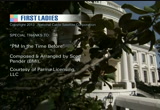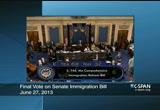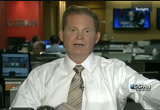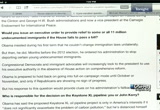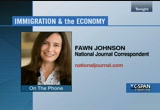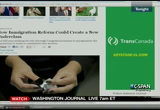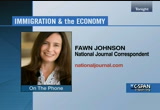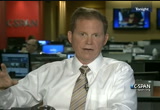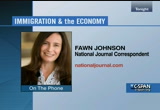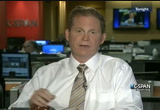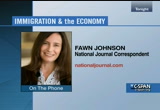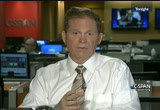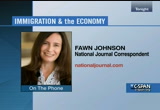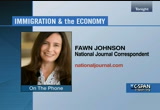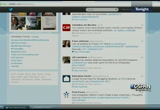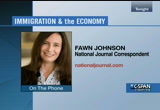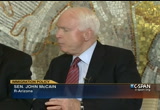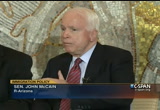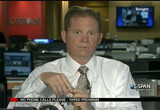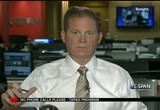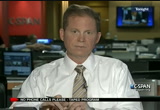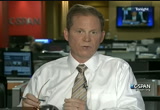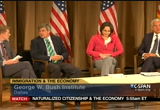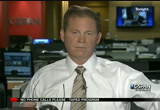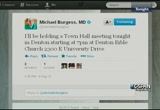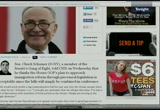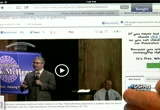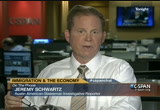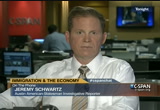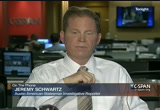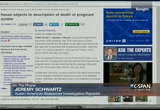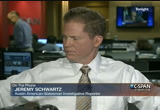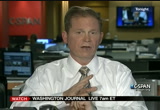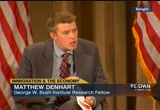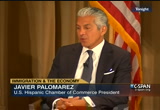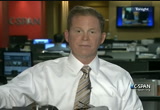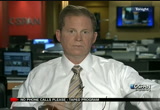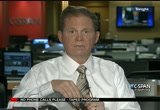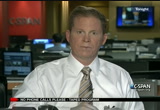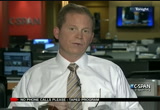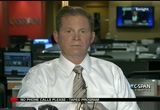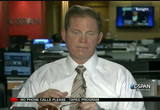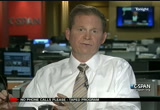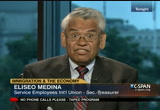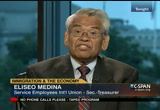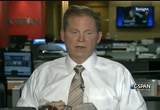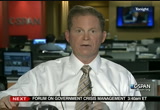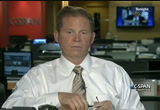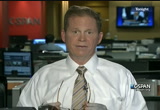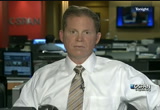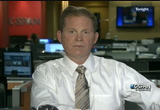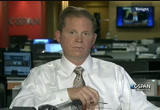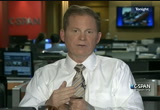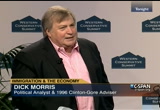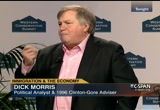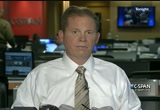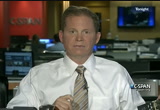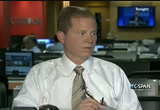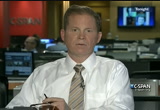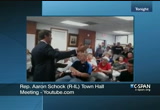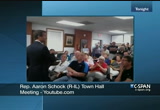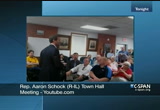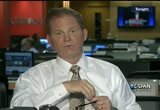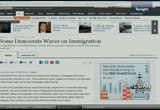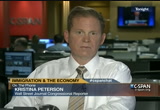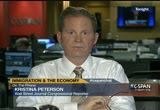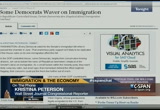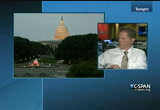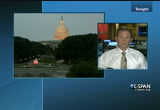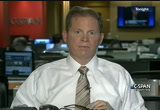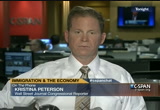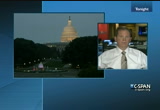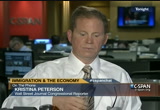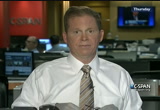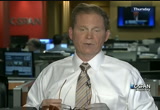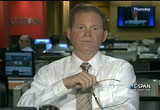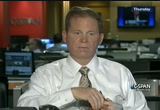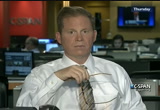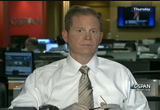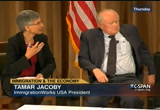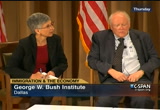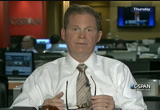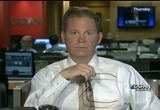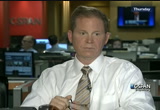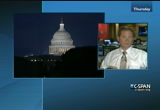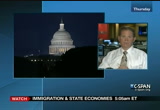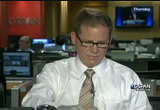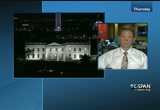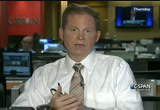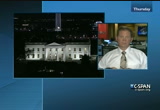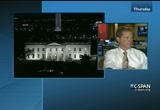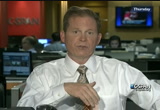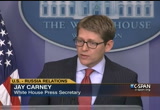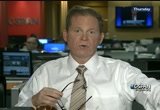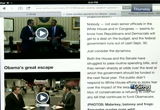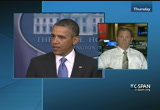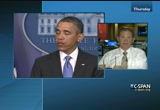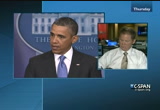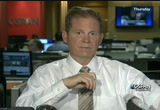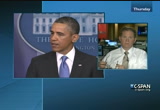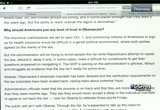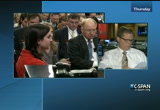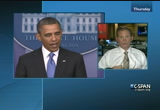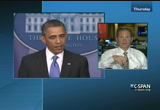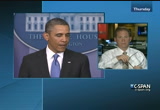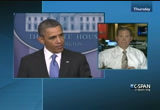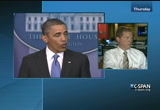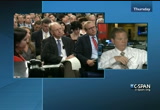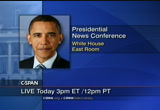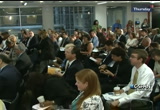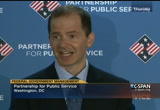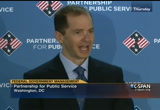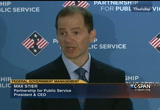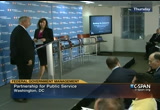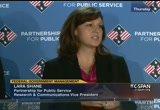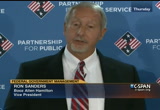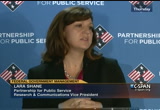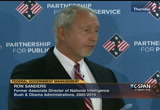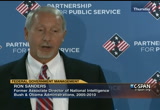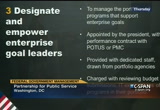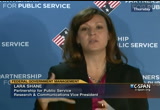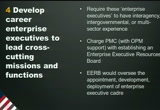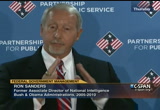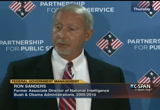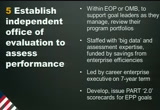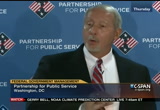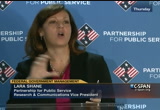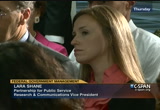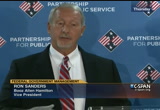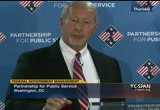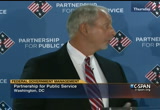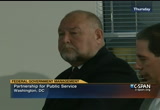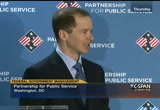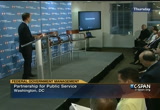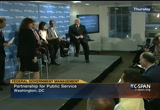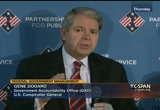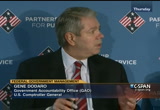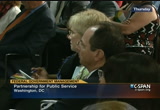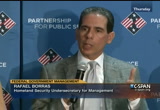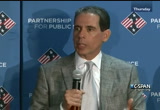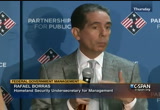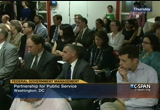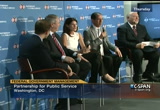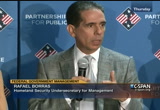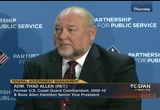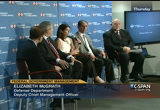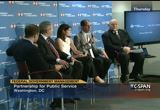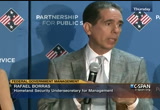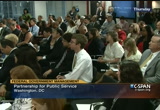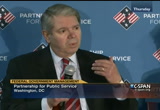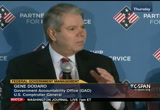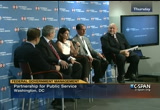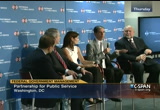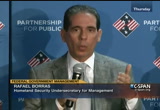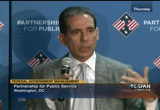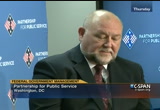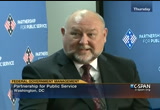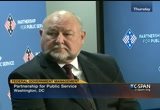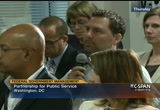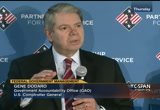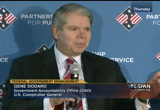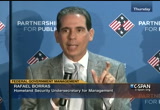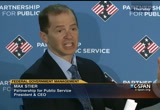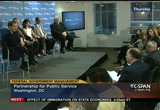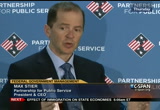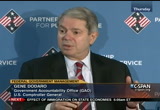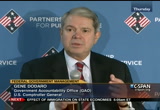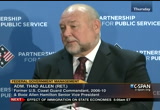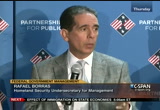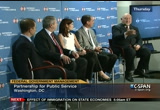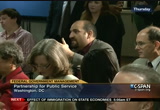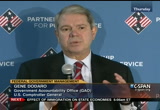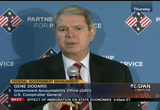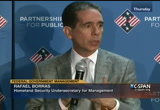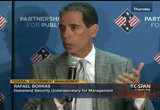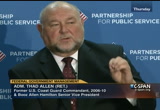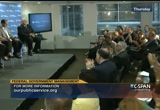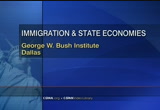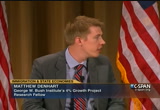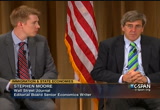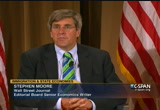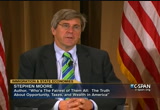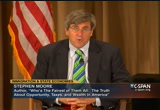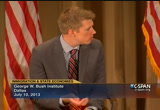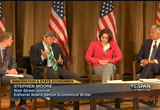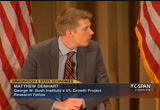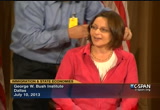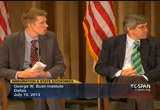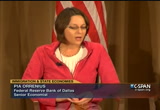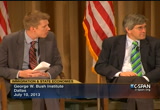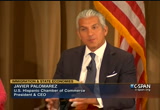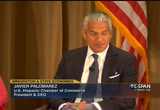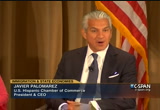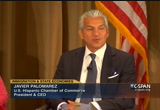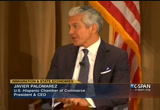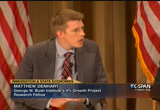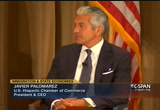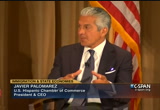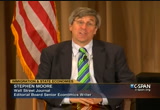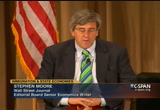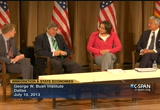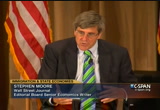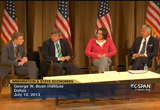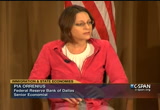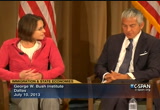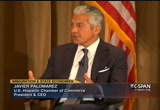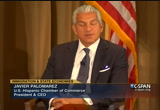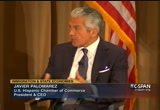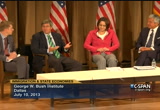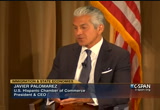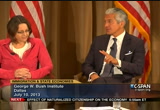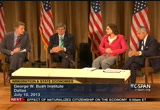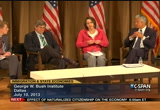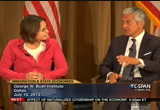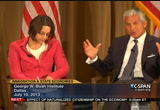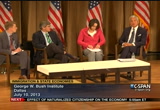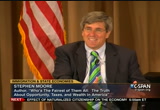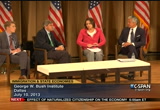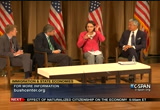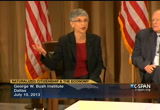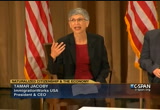tv Capitol Hill Hearings CSPAN August 9, 2013 1:00am-6:01am EDT
1:00 am
read into her. on the other hand, there are these wonderful bizarre letters confirming her addiction to chocolate of louisa catherine adams was a chocoholic. i say being married to the sourest man in washington, she took her sweets where she could find them. apparently she had her sons and others buy chocolate shells by the barrelful and she writes about the medicinal qualities of fudge. i mean it was as if she took it where she could find them. that's pretty pathetic. >> i would say that the shells are probably not bon-bons. she is not sitting on her sofa munching. they're the cocoa bean shell. you would steep them in hot water. it would be like coffee and you would add milk.
1:01 am
she was interested in the medicinal qualities of it. i wouldn't go too far on john quincy's sourness. there is affection between the two of them and great love. otherwise she could have stayed in quincy. >> after they lost, i think, the daughter, is it true he gave her a book on the diseases of the mind? >> some months later, yes. >> it's the modernize, the insensitivity. he is certainly not a modern husband. louisa had by one count nine miscarriages. >> minimum five and a still birth, officially more. -- potentially more. they are sometimes hard to read into it because of how discreet they are with their language. at least five with a still birth. she had a lot of tragedy. >> and three sons who lived to maturity. >> if you can call it maturity. >> speaking of their family, brian watkins asked on twitter, did having a former first lady as a mother-in-law help or hinder louisa?
1:02 am
>> of course, abigail had passed by the time john quincy attained the presidency, so she can't ask her mother-in-law about handling the role and the role had somewhat shifted. louisa generally follows the presence that monroe set, not attending public functions. it did help. she was familiar with her mother-in-law's opinions and the way she had carried herself. i think that she wanted in some ways to keep that in mind and honor that. >> did she continue the entertaining that she had done to get him to the white house once they were in the white house? >> no, not to that degree. the sociables were informal. there was music, there was often dancing.
1:03 am
once they get into the white house, the entertainments are much more restricted. they're open to a lot of people, especially the drawing rooms, but they're not, there is not that kind of dancing until actually the end of their term. as their on their way out, the last great drawing room, they actually have music and dancing and people stay until 2:00 in the morning and talk about how gracious the adams are knowing that they are, that they have failed in re-election and it's probably one of the greatest entertainments that they had in the four years. >> next is a question from leroy from kentucky. >> yes, ma'am. i am really enjoying this, this is great. >> thank you. caller: were the adams family, john quincy and his wife, were they god fearing people, did they attend church and teach their children things of the lord? i'm a minister so i'm concerned about this. >> thank you.
1:04 am
>> yes. louisa's religious views evolve over time. it's very interesting. her father was unitarian. she was raised in england where that was not an acceptable in england. she was raised in france so she was exposed to catholicism. the early years of her life with john quincy, they attend numerous types of churches, especially whoever the rotating preacher was in the capital during the secretary of state and presidency years could be presbyterian or unitarian. she ends up very much an episcopal thinker, high church and is very, in her later years, she spends a lot of time reminiscing and reflecting on the role of religion and it's very much an important piece for her. >> next up is nick in prince frederick, maryland, hi, nick. caller: hi. first of all, thank you for this great program.
1:05 am
i'm glad you are part of it. we have links to louisa catherine here. her uncle was one of maryland's first governors. the most we have is what of our town centers, we have a plaque. and a book where you get an impression of louisa catherine that she is very involved in the politics of washington. you don't get the sense of whether it is just a surface or whether her words are contributing to the compromises that are made during that time. would you mind commenting on
1:06 am
those two things? >> that is louisa catherine's birth family. in maryland? do you know of them? >> her family was from maryland. her father was born in maryland. that is very important because that is how she makes her claim that she is an american. i might have been born in london, but my father is an american. her uncle was the first governor of maryland. so, she has an important connection with maryland. she was able to use those when campaigning to get maryland to vote for john quincy adams the 1824 election. >> how about the second question, how involved was she in the politics of the time? >> it has always been murky. there is no clear why between social politicking and the process leading to x number of votes being cast.
1:07 am
one of the great skills begin with dolly madison, who understood that more could be achieved out of the committee room, off the floor of the house, in a social setting. louisa catherine is politically and attuned figure. i don't think you would find her dictating a platform. >> john quincy was 100 years ahead of his time. was the john quincy presidency about? -- what was the john quincy presidency about? >> john quincy was 100 years ahead of his time. famously, in his first message
1:08 am
to congress, -- remember this is a man whose legitimacy had been questioned. and yet, he introduced this breathtaking program that anticipates the new deal by 100 years. saying the federal government should in the rowboat business. there should be a national university and washington. he proposed a national astronomical observatory. a white house of the sky. for this, he was ridiculed by the jeffersonian small government crowd. it did nothing to enhance his popularity at the time. it may have contributed to his defeat for reelection. 100 years later, it looks prophetic. >> hi, jennifer. caller: hi. i am enjoying this series, i watch every week. >> thank you. caller: my question is, and it may have been shown during the program, i am sorry if i have not noticed, but the portraits you have been showing of the two of them, louisa catherine and john quincy adams, was there a
1:09 am
big age difference between them? >> thank you for asking. but explain how they met and with the age difference was. >> there is an eight year age difference. john quincy was born in 1767, louisa in 1775. they meet in london. he is the resident minister in the netherlands. he is sent from there to london to exchange the ratification for the jay treaty. by the times he gets to london, the business is concluded so he does not have a lot to do. what he spends his time doing is visiting the house of the johnsons, joshua johnson, her father, was the u.s. consul at london. he entertained all the americans who came through to london. a prominent merchant in london and americans would come and socialize and enjoy evenings of
1:10 am
entertainment with as many doctors, who are all talented. louisa play the harp. he would come and enjoy the company. after a little bit of time, made his intentions known that it was louisa and not her older sister, nancy, that he was interested in. they begin their courtship and engagement. >> after they married, did they return to the united states? >> not immediately. john quincy is appointed from the netherlands of the minister to prussia in berlin. this been the first four years of their marriage in berlin. she does not see the united states until 1801. the first four years are somewhat difficult. she has four miscarriages in the time before finally giving birth to her first son, george washington adams.
1:11 am
that cause controversy, naming the first son after george washington and not john. >> when she arrived to the united states, it was the first time she had seen the country of her nationality. she went to the adams's home outside of boston. the place was known as peace field. we will show you that. >> when louisa and john quincy first came to the old house, they had just journeyed back from europe, landed in washington d.c. and made the journey up to hear. -- to quincy. her health was not good at the time, and the journey was very difficult. she was brought to this has to to meet her father and mother in law. at that moment she would write, had i stepped onto noah's ark, i could not have been more utterly astonished. louisa catherine had a challenge in winning over abigail adams. john adams was easy, he took to
1:12 am
her right away. she always felt are a comfortable and well liked by him. abigail is more skeptical. perhaps due to john quincy's teasing. he only gave abigail a little bit of information about louisa catherine. he was not forthright in his intentions. it was a surprise that he married louisa catherine so quickly. abigail did not get a chance to know her. she was quite concerned, although she was an american citizen, she had never been on american soil. this was not what she intended for her son. through time, she learned to grow and love and understand louisa catherine. through the years, they forged a very strong relationship.
1:13 am
louisa catherine describing abigail adams as the planet around which all revolved. louisa catherine and john quincy, unlike john adams, if not live at peace field year- round. they only returned in the summer to get a relief from the politics of washington. her grandson, henry adams, remembered louisa catherine fondly. in his works, the education of the adams, he described louisa catherine and her role in this house and relationship with the family. he felt that she was the odd man out, because she was born in england and educated in france. she remained a foreign personality to many of the adams. he recollects her sitting in her paneled room, using her silver tea pot that that she brought with her from her home in england to the old house. she would entertain both herself and many guest in this room. john quincy adams and louisa would inherit this home from john adams. i thought about selling it, but then decided that it was
1:14 am
important to the family story to hold onto the house for future generations. >> you can visit there today. >> yes. >> wonderful. >> where are the papers? >> they are at the massachusetts histor sn ston. they used to be at the old house library, but they were transferred to the historical society for safekeeping. >> a question on facebook from genie webber. i have read excerpts from her autobiography, it said the massachusetts historical society was going to publish the papers. is that true? >> yes. a two volume of her autobiographical writings, which includes a record of my life, adventures of a nobody, and her narrative of a journey from st. petersburg to france, and all her diaries have already been published in a scholarly edition.
1:15 am
next year, a trade edition of these writings will be available. it has a foreword by former first lady, laura bush. >> we must talk a little about st. petersburg and her incredible journey back to meet her husband. can you tell was important about that story? >> in st. petersburg, the years were difficult areas it is cold, it is forbidding. there are not a lot of other women there. most of the diplomatic biased to not travel with her husband when they get sent there. i have a baby girl, louisa catherine adams, and the child dies after about a year.
1:16 am
that really devastates her mother. it is very painful. john quincy is also very much torn apart by the death. the war of 1812 has broken out here. he is sent to negotiated treaty and leaves louisa with her youngest son, charles francis, in st. petersburg. when peace is resolved and he is sure he will be returning home or sent to london, he asks her to join him. she makes this arduous journey from st. petersburg in the winter to paris with a son who is only seven at the time. and a couple of servings that she only met that day. she does not know she can trust them. as she is crossing europe, she encounters dangerous travel conditions, and napoleon has escaped from elba and is coming back to france.
1:17 am
she encounters the armies who greet him. she is crossing some very perilous territory in europe at this time. >> her life was in danger throughout this trip. >> here is another quote from her diaries -- it was 4:00 in the evening and the ice was in so critical a state, i could with difficulty procured men and horses to go over. they informed me i would have to make a long detour if i could not cross. attendedge would be with great risk, if not in danger. >> absolutely. >> and a carriage in the wintertime. >> again, the resourcefulness of this woman is extraordinary. >> why don't we know more about her interesting life story? why is she not better known among the first ladies? >> because john quincy's presidency has been obscured for so long, that diminished
1:18 am
interest in her. what makes john quincy interesting to historians today is his post-white house years, for which people did not seem to think that louisa was a part of. somewhat mistakenly. i think that has really kept her from being the prominent -- and abigail kind of outshines when you are talking about the adams'. it kept her from getting her do a little bit. >> carol is watching in santa fe. caller: this is a fantastic series, i love it. you keep referring to the white house, and i understand it was called the presidents house for some time. do you know when it changed its name to the white house? >> teddy roosevelt. the beginning of the 20th century. he formally changed the main to the more informal white house.
1:19 am
at the same time that his wife is taking the house back to its more formal style and side. >> is it true that some of the exterior was painted white after the fire from the british, to cover scorch marks? that is when it began. >> it was informally referred to the man on the street did not refer to it as the executive mansion. teddy roosevelt made it official. >> a call from catherine in rockville, maryland. caller: just wondering, was louisa ever, worker rights ever violated and wanted to do about it? >> what are you thinking of? caller: social or things like her speaking out for what she believed in. >> this is a great restaurant to
1:20 am
talk about what role women -- great question to talk about about what role women really had in society at this point in time in america. >> she is not political, she is not speaking out politically the way that abigail did with her husband. she is not a public political figure speaking out on these things. she has her own private views on some things. her views on politics are more about how people behaved. she is much more interested in everyone conducting themselves properly. even people on her own side. she doesn't like it when people who support the policies that her husband supported have crossed a line in terms of decorum.
1:21 am
she is not trying to get out -- she's not an activist. i would not want to say that. >> nearly 100 years until women have the right to vote, we should point out for our younger viewers. what role could they play? where did their power come from? >> there is a coda to this story. just as john quincy became more and more outspoken in his opposition to slavery, and famously played a role in the amistad case. there was something between louisa and the green key sisters, who were pioneering activists and abolitionists of their day. i think she comes as close there as anywhere else to spelling out a sense of women's roles.
1:22 am
>> this is an interesting time. her mother in law has passed. we think about gil adams and her famous words to john, remember the ladies. abigail's letters were becoming more published, and louisa saw an affinity between her mother- in-law and herself on women's issues. >> towards the end of louisa's life, there is the sense that she seeks an equality of the mind for women, but not so that women can run for office. it is not that kind of feminism. it is that women can better fulfill their primary functions as mother, wife, and daughter. they had this god-given, this is where her religion comes in, but
1:23 am
god had created man and woman equal in this way. that was how she could -- in their mind, they could be equals and partners, complementary partners, not for women to become more like men. abigail's feminism as it were is somewhat along the same vent -- bent of allowing women to become better republican mothers and wives to allow men to fulfill their calling with honor and dignity. >> does john quincy seek re- election? >> he did. a lot of people think it was the most scurrilous campaign in history. it was not close at the end. andrew jackson denied the presidency four years earlier, overwhelmed john quincy adams. like his father, he did not stick around for his successors inauguration.
1:24 am
he did come back to washington a couple of years later in a unique role. the only american president to this day who came back as a member of the house of representatives. >> there are a couple of first here, the first father and son to serve in the white house. the first and only foreign-born first lady, and the only president to come back and an elective role in the legislature. >> history repeated itself in a tragic way. john and abigail lost a son in the time between his defeat and inauguration. george washington adams, who i suspect the pressure of that name would drive anyone off the wall, he almost definitely committed suicide. >> just when his father was losing the election?
1:25 am
>> it was may 1829. the power had already shifted to andrew jackson. they asked george to come back to washington to escort family to quincy. he either fell or jumped off the boat. devastating personal tragedy. >> two years later, his brother died of alcoholism. >> 1834, it was a little bit later. >> one child survived. what about their grandchildren and heirs? >> there are a number of grandchildren. john adams the second, he had married his cousin and had two children. john quincy emily said became the guardians to those children. the younger one died in another tragedy.
1:26 am
charles francis adams married abigail brook, and they had a number of children. they are in boston. so john quincy adams only see them during their summer breaks, because they spend pretty much all their time in washington. >> cheryl from santa barbara. caller: thank you so much for having the program. i am really enjoying it. i was wondering if you know what louisa catherine's size was. she looks very petite in her pictures. >> do we know? >> she was definitely slender. i cannot tell you how tall she was. i don't think particularly -- she remained slender throughout her life.
1:27 am
>> i heard somewhere, about five foot six inches. hers? there dresses of >> i don't know. there might be. >> after the defeat for election, they go back to boston and stay there for how long? >> not very long. in 1830, there was an election from another district, and john quincy accepts the nomination and spent the rest of his life, literally will die with his boots on, suffering a stroke on the floor of the house of representatives. >> they come back to the house on f street that they built for all of the social entertaining that got him to the white house. what were their congressional years like here and especially for her? >> they don't come back to f street initially. the house had been rented out during the presidency. they come back at the end of the 1830's.
1:28 am
these years are much better after about 1834. the first few years are filled with tragedy. things really improved. they are able to socialize and entertain and have these dinner parties, but there is number -- no more striving. they have reached all that can happen. i think that these are years more of peace. there is a lot of political struggle certainly. between her and john quincy there is something of an understanding. she knew that he needed politics in order to live. even though she had been very angry at his insistence and going back to washington, she even threatened not to come to washington. eventually she cooled off and decided she would follow him after all. between them, mostly good years,
1:29 am
even with all the political fights over the gag rule. >> it was a 50 year marriage. >> they had been through the worst. the white house was a thing of the past. i think she was more likely aligned with him in his congressional career. stuff that had come between them was in the past. in some ways, they grew closer in the last years. >> did she begin to influence him on issues like slavery and women's rights? >> she would not use influence in that way. and women's rights, i certainly don't think that is something that they would have really discussed in that way. it was not something being put forward in congress. slavery, they saw pretty much eye to eye. it is hard to say who influence to where they both got there on their own.
1:30 am
he felt freer in congress to be active about it. she had family members who were slaveholders, being from maryland. both of them, they don't like slavery. that they are gradual abolitionists. neither wanted immediate abolition. >> jennifer sherman offers, the adams women offered a different type of feminism. let's take a call from jeffrey in sarasota. caller: hi. i am a history teacher who grew up in connecticut, but now lives in florida. i am very interested in the adams family. he brought up the question i had, whether or not louisa had difficulty with her father's family being from slaveholding maryland. view sort of alluded to it. that was one question -- how
1:31 am
difficult was that for her on a personal level? the other one is just a curiosity, did she live long enough to get her photograph taken? do you have a photograph of her? >> thanks for the question. are there any portraits of her? >> i don't know. there might be. john quincy had a photograph of her. i am not 100% sure of that but you should check the portraits volume of the adams papers. >> our producer is telling me no photos. they spent a long time looking. we have about three minutes left. john quincy dies a dramatic death. >> first of all, one reason why life was him i think, better for them at the end, the public attitude toward them have
1:32 am
changed. admirers call him old man eloquent. his career in congress was an expression of that dogged commitment to principle, even at the risk of unpopularity. at the end, it he won some of his battles. repealing the gag role that slavery had imposed on congress. he became an immensely respect to elder statesman. in february 1848, on the floor of the house, one member of congress looked over in his direction and said, mr. adams is dying. his forehead had flushed, he tried to stand and fell over. he was carried to the speaker's office, just off the floor of the house. henry clay came to visit.
1:33 am
louisa came, and he did not recognize her. supposedly, his last words were, this is the last of earth, but i am content. which i don't believe, i don't think he was content for a moment. he died doing his duty. >> do we think it was a stroke? >> yes. >> how old was he? >> 81. >> and how long did she live after his death? >> she lived another four years. she stayed in washington, and by her son's wife. she lived quietly. her health is fading. she had a stroke the following year and is somewhat invalid for the rest of her life. charles francis adams actually meets with her about a year before she dies and records in his diary how content she seemed.
1:34 am
not that she was looking forward to death, but that she had truly resigned herself and would face the end with great courage and faith. >> you are looking at some footage of the presidential burial place. if you ever get to massachusetts, it is quite a resting spot of of presidential couples, buried side-by-side in a church. >> the church of the presidents. >> the two memorials with flags are the two graves of the presidents themselves. we invite you to put that on your list as you do historical touring. something you have done a lot of. we have one more call left, this is william from winston-salem, north carolina. caller: i remember seeing a few years ago, believe it was david mccullough, talking about the adams women and the strength of them. their inner strength.
1:35 am
he mentioned something about one of them having had the breast cancer and had surgery in the days before anesthesia. >> i am going to jump in because our time is short. that is abigail adams daughter who had breast cancer and a mastectomy in the days before anesthesia. >> 1813. >> she eventually succumbed to the disease. >> yes. we really want to bring all of these conversations back. go. what should louisa catherine adams be remembered for? >> she is a fascinating figure, the interest in her should be every bit as much as for her mother-in-law. she is a woman who saw more of the governments of the world than most women of that day.
1:36 am
in london, berlin, st. petersburg, washington. she truly experiences and reflects on these experiences through her letters and diaries and memoirs in a way that ring a richness to our understanding of the period she lived in. >> and a life of tragedy. she lived through extraordinary events. crossed paths with remarkable historical figures. it was in the life where she suffered loss after loss. even the presidency turned out to be, in many ways, disappointing. that is not the note on which the story ends. there is real inspiration there for all of us. >> thank you, as always for your expertise. amanda, nice to meet you and
1:37 am
thank you for helping us learn more about louisa catherine adams through your extensive work on her papers. thanks to you for being with us and the white house historical association for their help in producing this series. [captioning performed by national captioning institute] [captions copyright national cable satellite corp. 2013] ♪
1:38 am
>> our encore of the series "first ladies" continues. two septemberason 9. we found out more about the first ladies including a special section welcome to the white house, produced by the white house historical association their chronicles life in the executive mansion during the tenure of each of the first ladies host that we are offering a special edition of the book first ladies of america. for a discounted price of $12.95 plus shipping at c-span.org/products. >> c-span, we bring public affairs from washington directly to you, wouldn't you in the room at congressional hearings, white
1:39 am
house events, briefings, references, and offering gavel a publiccoverage as service. c-span, created by the tv industry years ago and fundamental local cable or satellite provider. you can watch us in hd. >> on the next "washington bell talks about whether tracking. tracking. then a look at race relations in the u.s. janet cohen. bureau discusses state and local government government finances. "washington journal" live every morning starting at 7 a.m. eastern on c-span. next on c-span, the town hall
1:40 am
1:41 am
>> the very end of the vote back on june 27 of this year in the u.s. senate chamber, the senate immigration bill, passing there by a vote of 68-30 two, arguably one of the most significant is a legislation that passed the senate, this term. welcome to c-span town hall this evening. here on c-span, c-span radio, throughout the next five weeks, tuesday, wednesday, thursday evenings. we are taking times looking at major policy issues, politics, and issues of the day. we will spend a couple of hours tonight looking at immigration and, in particular, immigration and the economy. your thoughts on what immigration means to the economy, what economic policies, what immigration policies would be best for the u.s. economy. a couple of ways you can participate, as always, on the phone. if you are a republican, the number is --
1:42 am
we are also on twitter and facebook. we posted the question earlier today about economic policies, immigration policies, best for the country. we want to talk about some of those before us became at your will. here is a post from francis's says, the bill is welfare for military contractors to replace their middle east more money for securities, another way for the gop to fund corporate greed. rick said -- i want to also let you know later on we will change the topic later on to ask you about some of the things you would ask the president. jonathan is posting six vacation free vacation questions or
1:43 am
-- pre-vacation questions for president obama, and one deals with immigration. we will have tomorrow's news conference live here on c-span and c-span radio. "would you issue an executive order to provide relief to undocumented immigrants of the house is passed the bill. obama insisted during his first term they could not change the laws unilaterally but he did. joining us to talk a bit about that and further action ahead on the house is fawn johnson. what are you hearing about the potential plan b? >> started to talk about it more openly. in the past year or so, they have been really on congress and trying to get something passed in congress.
1:44 am
that is everyone's first choice. what are you hearing about the potential plan b? >> started to talk about it more openly. in the past year or so, they have been really on congress and trying to get something passed in congress. that is everyone's first choice. it is slowing down the possibility the house will not pass on the go. people who president obama, as kerry and john put in their story, it expand his current program he has to deter deportation. their hope is that will happen.
1:45 am
they do not need to go through all of it for some -- to vote to pass in congress. the current population removed deportation and allowed them to get work permits. they hope to get a better deal later down the road. >> also with a new article online, how the immigration reform could create a new underclass, an extensive article on this. what is your point on this article? what are you trying to say? >> this is something i've spent a lot of time thinking about.
1:46 am
many in that community is undocumented. the question explored in the article is, the senate immigration bill has, that people would get a legal status, they would be in a legal limbo. 10 years at least before they get a green card. another three years before they can actualize citizenship. there is any number of things that could happen to cause them to fall out of status. one of the biggest ones people are worried about, if a person who is sponsoring an entire family for this legal limbo status they have in the senate bill, if that person is out of work for 60 days or longer, they are not qualified. what happens, their entire family, as they are dependent on this one person, could fall out of status. there is no real way of getting them back onto it. if you just think about it in terms of a family, with children, a child could come out to this provisional immigrant status.
1:47 am
that person would not have a green card until they were 16. during that time, they have test -- access to know federal benefits at all. no food stamps. nooks subsidies under the health -- no subsidies under the health care law. they are essentially on their own. i argue what you are looking at is essentially an underclass with a lot your chances of read tension than regular citizens. also, safety net. it is a tough question whether or not you want that sanction. >> we are talking about the economic impact of immigration reform. you get to a point where you quote ted kennedy, who pointed out better to get half of what you want.
1:48 am
do you think there are enough members in congress who want to get that half a loaf and are willing to settle for the something rather than falling short of the house and senate on an immigration bill? >> that is an excellent question. it is probably a majority of members who would like to see something get past. they would be in the vein of ted kennedy. it is better than nothing. i do not think a majority of republicans want to see that happen. that is an issue because it is led by republicans. it is important to keep in mind there are a lot of people who are very turned about how much they will have to see in terms of harshness in order to legalize them. there may be a majority. it would fall into a minority relatively quickly if the deal
1:49 am
swung too far being punitive. it is a tough question. this is something anybody in congress has to do with all the time. the idea is, if you are a good legislator, you want to pass legislation that does good. the reality is, when you are writing legislation, there is no way to predict all of the consequences that would come through. especially when it comes to something like immigration, which is a lot of what they are talking about right now in the senate bill and the house. it is something that is a compromise. it is not what anyone would want if they had a choice. >> fawn johnson our guest as we focus on immigration and the economy, i wonder if you could hang on or a few minutes and hear some of our calls from across the country. let's hear him on our independence line. thank you for waiting. caller: this is so ridiculous to me. these people are here illegally. i live in a city where we are bombarded.
1:50 am
these people are getting free welfare. we have to pay for their kids to go to school. our kids come home from college and they cannot even get jobs because most of the people are working in mcdonald's in different places. they hire their family members. i do not understand why there is a question. what are americans supposed to do as far as getting jobs? >> thanks. -- jobs? >> thanks. any thoughts? >> the caller brings up a very important point. there are some misunderstandings. no disrespect. it is very difficult for a company like mcdonald's to hire an illegal immigrant unless they have fake ids. they have to be pretty sophisticated fake id's. they have broken the law and are taking jobs away from people who are legitimate american
1:51 am
citizens. the problem is, at least from people who want to actually change it, is that those illegal immigrants are not going away. it is harder to leave the country than it is to get in. some things, they are trying to figure out something to do with them. the color made an important way. you want to make sure everybody has access to jobs. the perception is that immigrants are taking those jobs and it will be hard to pass something in congress. >> you write about the underclass, those federal benefits, in particular, the debates over the health care law, which shut out illegal immigrants. am i right? >> it is a very interesting debate. there is a little misunderstanding from the caller.
1:52 am
immigrants are not allowed to have the kinds of benefits americans have. they cannot get welfare and medicaid. then, under the health care law president obama signed, they cannot have subsidies in the state and national exchanges. it is true all immigrants, illegal and legal, can go to school. they can have things like school lunches. just to clarify how that works. what is more interesting is because of the unwillingness -- there is a policy idea in washington that immigrants should not have safety net benefit, that that is something reserved for citizens, you have a situation, if you were to legalize 8 million undocumented immigrants, where they are now shut out of obama's health care law, and they also are shut out from the mandate that says you have to have insurance, because it does not make sense to shut
1:53 am
them out -- you have an odd situation where you have people who drafted the health care law, all of a sudden, there are people directly opposed to the goal. the problem is people are trying to sell the immigration problem are not trying to solve the other problem. it works out that for a legalization program like this to become law, how many people would qualify, it would be around 8 million. those people, if they do not have insurance already, probably will remain uninsured. because they are mostly young and tend to be healthier than the general population, it is what you want in an insurance pool. it will not happen because of this tenet that we have in
1:54 am
immigration policy that they do not get benefits. very competition laws and how you deal with the population of people who are here but not in any legal status. >> fawn johnson reports for "national journal." caller. to our next good evening. caller: 11.5 million immigrants here in america. i think we need to find out exactly how many of them do want to stay here. i live in a rural environment. i spoke with two elderly mexican ladies.
1:55 am
as soon as they make enough money, they are going back to mexico. they have no intention to learn english. i find a problem with this 11 million people. it sounds like they do not want to become american citizens. >> is it a requirement to learn english? >> if you want to get a green card. that is at the end of the 10- year process. it is not clear how the people would learn english, but that is a requirement, as well as staying employed. yes. >> fawn johnson, thank you for joining us. you can follow her reporting. nationaljournal.com. we appreciate you being on the program. >> a pleasure. >> more of your calls coming up, looking at the issue of the economy and immigration. recent comments from senator john mccain, a supporter of the immigration bill.
1:56 am
[video clip] >> the month of august is a very important month. the members of congress will pass in the senate. in this case, because the focus is now on the house of representatives, they are meeting with various groups. i think it is very important as is our constitutional right, to potential -- petition members of congress, elected representatives, that is in the constitution, should be seeking meetings with and communications with our members of congress. i have traveled throughout the state, meeting with various interest groups, ranging from
1:57 am
evangelicals, to various an organization -- throughout town hall meetings, about the importance of acting on this legislation. i think this fall is very important. because we get into 2014 in an election cycle. the issue has really ripened to the point enough americans are aware of it that we will act or not act. i have seen 100 polls indicate well over 70% of the american people support a path to citizenship provided that -- i will give you straight talk -- provided that the payback taxes learn english, and get in line behind those who came to the
1:58 am
country legally. that is an important aspect of gaining the support of the vast majority of american people. the reason why the vast majority of american people support it is because they realize, and they have grown more to realize, since ted kennedy and i have fought this battle and lost, that this is an issue of 11 million people living in the shadows, depriving the rights of our citizens, who cannot live normal lives. they are not going back to where they came from. it is de facto amnesty. those who claimed it is amnesty, the bill we are trying to get done, it is already because they -- already de facto because they are not leaving.
1:59 am
people live in the united states of america without the protections of citizenship, then some of them, and maybe many of them, are exploited and mistreated in a broad variety of ways. that is not what america is supposed to be all about. >> john mccain's remarks from a couple weeks ago on immigration. senator mccain has just returned from egypt, meeting with egyptian leaders there. he and senator lindsey graham. -- he also commented on the situation in russia, the decision to cancel the bilateral meeting with vladimir putin and president obama. in the blog, mccain rushes and sends relations back to 1955. the recent actions toward the u.s. have reset relations with america back to the cold war era. russians have reset back to 1955, he said in an appearance on cnn this evening. checking a quick tweet on the
2:00 am
topic of immigration and the economy -- now was not the time to talk about how to get people here legally. deportation is a must. next, to calls. thank you for waiting. caller: yes. we came illegally from 1959. prior to leaving, we were checked for our financial ability, that our health was clear of contagious diseases, and we were expected to providea sponsor. as a union carpenter, my job was transferred to american
2:01 am
2:02 am
i never had to look over my shoulders to see of authorities were after me. we were able to live in american without being cheated out of wages or looking for health care. >> before you became citizen, did you ever feel resentment from people who might not have had a job as good as yours when you were still an immigrant? >> that is true, but so are several others on the job. there were many immigrants then, and never once did i have anyone resent me because i did not make the same wages they did. >> you are on the air. i was there to respond to the
2:03 am
2:04 am
>> in what field in particular in your area? caller: construction, drywall, anything you can name. framing. even in power line construction. i have spoken to some of these people. they do not know what they are doing. a new company, last year, we had power outages for seven days. the first time ever i could remember since four years old. what are we? a third world country? are we going to settle for the standard of living our forefathers fought for so one party can get all the liberal voters we can? we have got to start thinking about the working people. then wall street and all these good leaders created over the past 50 years. our topic tonight is immigration and the economy. speaking of wall street, stephen moore talked about the economic impact, the importance of getting immigration right toward the economy. here is part of what he had to say. >> you have seen over the last five years, roughly, about one million new jobs in the state of texas in the last five years. roughly one million lost jobs in
2:05 am
california. it is amazing. one of the points i made for writing a book on this, what we are seeing is one of the great wealth transfers in american history geographically from states like california that do not get it right, and my state, and states that do get it right, like texas. this is one reason to be bullish on the future of texas. one of the interesting things is texas does a much better job, in my opinion, of economically assimilating immigrants so they are successful here. california is more of a welfare state. it indoctrinates immigrants into the welfare system at a much higher pace than texas does. people come to texas for jobs. people go to california for welfare. you are seeing the differing economic outcomes as a result. texas is the model other states
2:06 am
should be emulating. >> stephen moore from a recent discussion we covered. when you see some of those clips, the video portions, you can see them all in our video library. he was comparing jobs in california and texas. we will go to texas next. john, on our independence line, good evening. caller: i agree. the more immigrants we let in, they will go back to where they came from, not learned english, mexico, guatemala, wherever they came from, what is the point? they are taking jobs away from americans. wages do not go up. the wages down here have been low for years. because, there are many illegals in the area. that is -- what is the answer?
2:07 am
i do not know. in order to deport them, you take them right to mexico, they are back. some of them are hard workers. how do you decide who is tuesday and who is to go? >> thanks for your call. more of your calls coming up as we look at the issue of immigration and the economy. we had a chance to do these town halls because congress is in recess until early september. we are keeping an eye. here is a tree from the representative of texas, talking about a town hall he is holding tonight. in denton starting at 7:00 p.m. eastern. another one here -- if you want to participate in the discussion on twitter, #c- spanchat.
2:08 am
when the house comes back, the house will take up pieces of legislation. the senator from new york talk a little bit about that from cnn. the comments -- the headline -- he says in part senator schumer told cnn wednesday he thinks the house gop plan to approach immigration reform through a piecemeal legislation is acceptable since the bills will be combined in conference. they would much prefer a big comprehensive bill. anyway the house can get there is fine by us. i am optimistic we can get this done. i have had a lot of discussions with oath -- members of both parties. in other news, and across the world bombing today in
2:09 am
afghanistan. this marking the end of ramadan. a bombing that killed 14 people, the headline, the bomb hidden in afghanistan cemetery kills a family of 14. you see a picture there, afghan men preparing graves for a bomb planted in a graveyard. ask to the united states and town halls across the country. we go to north carolina and, with representative patrick mchenry. the headline from the asheville newspaper, the website there, mckendree gets an earful on healthcare. they write in part that all
2:10 am
patrick mchenry had to do during his meeting was offer an invitation to stand up and be heard. 30 people swiftly moved in lines on either side to ask questions. some of them pointed, many about obamacare. they wanted direct answers wednesday evening. many of them, skip edwards, he did get heat during the town hall meeting in asheville. joining us from texas is jeremy schwartz, who reports for the boston american-statesman. he is covering the trial and the fort hood shooting. thank you for joining us this evening. >> thank you for having me. >> give us that ground on the shooting that happened two years ago. the case got underway this week. it is not usual because he is acting as his own defense attorney, correct? >> that is correct.
2:11 am
the shooting actually occurred four years ago. hard to believe it has taken so long. but yes, his attorneys have been dismissed and he is acting as his own attorney. there was thought there would be excuse me -- confrontations with on the witness stand. so far, he has not cross- examined any of them. >> he is allowed to, by acting as his own attorney, he is allowed to cross examine his own witnesses? >> he gave an opening statement. he can make objections and he can cross-examined. he has cross-examined a couple of witnesses, but not shooting victims. he will be able to give a closing argument. >> he has backup attorneys, i understand. something happened with that today. tell us what the judge decided today.
2:12 am
>> that is right. his standby attorney have asked to be removed from the case. they believe, and there may be truth to it, that his son is seeking the death penalty and is not putting on a defense that would save him from the death sentence. they feel it would be morally repugnant to assist him in any way in the defense. they would basically be removed from the case, not entirely, but not help them with day-to-day activities. the judge today denied that and ordered them to continue helping.
2:13 am
they are appealing the order, but the trial will continue if the appeal goes through. the odds of that being successful are low, in addition to being a judge is order, it is an order from a higher ranking officer. they would be in quite a bit of trouble if they tried to defy the order in any way. >> you have been reporting, updating your story. one of the headlines earlier today, what was that about? >> that was an interesting moment. there was a soldier among the 13 dead who was pregnant. in other testimony, it has been widely described she said, "please do not, my baby, my baby." a witness testifying testified,
2:14 am
she said, in the moments before hassan shot her, giving the distinct impression he heard the cries for help and still shot her. hassan objected to that. he asked the judge to remind the witness she was under oath. the witness was asked if she wanted to change any have heard of her testimony and she defiantly said no, she did not want to change a word. he is facing 13 counts of premeditated murder and 32 counts of attempted pre- meditated murder. 45 counts in total. >> one last question. what is your sense of how long this trial may go? >> it is a fairly quick pace.
2:15 am
15 witnesses today. the original estimate was up to three months. the way it is looking now, i spoke with a military legal expert who thought the prosecution might be done within about three weeks. he has said -- two witnesses, one of whom may be himself. we do not know yet. we do not -- there is speculation he would take the stand himself, which would be an interesting moment, because he would open himself up to cross examination from prosecutors, which defendants very rarely do. >> joining us from texas, he is covering the trial. you can read his reporting. thank you for joining us this
2:16 am
evening. >> thank you. i appreciate it. >> back to your calls shortly on immigration and the economy. we wanted to bring you the comments of the president of the hispanic chamber of commerce. here is what he had to say. >> one more follow-up. it seems like we hear this everywhere. it seems like it is almost conventional wisdom and i do not think it is. we hear, we need protections for american workers, this idea. if it's just facilitates this myth that immigrants come and take jobs. even those in washington on either side, they seem content to buy into that that we need to buy protections for american workers. how you respond to people who say that immigrants, and take jobs? >> we would do well to really look at what has transpired in
2:17 am
other states, neighboring states. you look at what happened in alabama recently. that state passed an anti- immigrant piece of legislation. the fact of the matter is, when it is all boiled down, you look at the end of the case here, they have 40,000 workers get up and leave the state. what ensued is the state lost about $10 billion of revenue. and about a half billion dollars of taxes that it could have garnered had the workers stayed in the state, or in the plants, work in the construction sites. i think there is a lesson learned. i think that sentiment was part of what happened in alabama. i am hopeful that would never be the case in the state of texas. i think government -- governor bush, then president bush, it
2:18 am
illustrated leadership in terms of his understanding in terms of the immigrant communities, the work that immigrants come here to do, and i think he welcomed immigrants to the state of texas. i remember fondly his relationship with the van president of mexico. and a very clear, clear minded understanding of the contribution immigrants make to the state of texas. there are lessons to be learned, when you study what has happened in states -- no one came back and fill the jobs immigrants left unattended. >> back to your calls here. the economy and immigration reform. craig is on our republican line. thank you for waiting. go ahead with your comment. caller: thank you c-span, and seattle. i am calling on the republican line, but i am thoroughly disgusted in a whole parade of
2:19 am
traders, and that includes john mccain, lindsey graham, george bush, who has sponsored the center in texas, and i suffered through two hours of propaganda out of the bush center, and they treat america as a whorehouse. stephen moore treats america like a whorehouse. it is not about the money. c-span keeps playing all of these people. i want to see some balance. one thing mentioned at the george bush center from the hispanic chamber of commerce guy, he was lobbing these wonderful hispanic companies. have any of them enrolled in either a five so they will be true to the 1986 amnesty, which, at that point, required all employers verify eligibility by these workers.
2:20 am
they have not done it. we have george bush, mccain, they have done nothing but subvert the law for the last 25 years, and they are trying to put the nail in our coffin now. i would like to see more balance from c-span. there was a wonderful march for jobs in washington dc. i have seen none of that on c- span. i would love to see that. jeb, much loved in alabama, he was the speaker of the conference. the best republican in this country. we will get rid -- democrats and republicans will join and get rid of these people. they are liars. they subverted the law many of them voted for. including mccain. they have got to go and they are going to go. >> thanks for the call. our democrats line. hi. caller: how are you? as far as immigration is concerned, too much is given to these illegal immigrants. these women are having all of these babies. they can go down and get
2:21 am
welfare, food stamps, and they keep having babies after babies and they know they can go down and get a check for each one of them. that is draining our economy, too. they need to pass a law where these people cannot come and have babies and go down and get food stamps and subsidies to housing and different things like that. it is awful these people are letting these people come over and drain our economy. >> you are saying in your experience, these things happen? caller: yes. it just happened in d.c. our mayor will let these illegal immigrants have a driver's license. they cannot read english. they will cause more accidents and so forth. it is getting to be trouble. there are senior citizens who cannot get food stamps. in kentucky, west virginia, poor people, they are not even helping these americans.
2:22 am
>> thank you for your call. florida. we hear from paul, independent from florida. caller: one woman said it would cost more money to send them back -- i think it is a lot of bull. we should drive them to the border and say, get out. as far as elected officials, they are a bunch of crooks, everyone of them. they ought to be kicked out of town. that is how i feel about the country. i love my country dearly, but i despise the government with a passion. >> thank you for your call. a tweet here. they tweet, the unemployment rate in alabama dropped like a rock.
2:23 am
it was a good thing. #c-spanchat. what is happening in the senate, what is ahead in the house, and the economy? caller: thank you. long time listener and first- time caller. i agree with most of the people who have already. i am a registered republican. i am pretty liberal myself. the republicans are on the right side of immigration. john mccain is a black eye to the republicans. he said, not supporting the immigration rules they want to pass is a like political suicide, which says to me, they are only concerned about keeping their jobs. i do not think immigrants take jobs away from americans. they replace from americans. all your callers so far talk about this. i am a victim of this. i had to leave my home town i was born and raised in because i became an unwelcome minority in my hometown. >> what job did you lose?
2:24 am
caller: i was working in a factory. we were all replaced by workers south of the border. the factory eventually closed and left. what they said about california, the same thing here in new york, i can tell you from long island all the way to the canadian border, all the gardening crews, landscaping, all the construction crews, mcdonald's, everything, spanish-speaking. i assume it is the same problem they have in california. immigration is not controlled. two things i resent. i think the caller is right, you do need balance. the other thing i wanted to say is illegal aliens and immigration is not a civil rights issue.
2:25 am
there should be no civil rights involved. it is a sovereignty issue. for americans to decide who, how many, when, and in what circumstances people come here. it is not civil rights. that is how our media tries to portray the problem. although aliens, immigrants must register for selective service. if someone is here illegally and becomes a citizen and they have not registered when they turn 18, they are not entitled to any kind of benefits from the government, at all. no welfare. >> thanks for the call. just the other day, we had the secretary-treasurer join us. he responded to the question about the undocumented, the 11 million undocumented, and whether they would get a free ride via the senate version of immigration reform. here is how he responded. >> let me say, nobody is going
2:26 am
to get a free ride. the senate bill that was passed, it has to pass before people can legalize and become citizens of the u.s., it will take a total of 13 years. they need background checks to make sure we know who they are and what their intentions are. we have got to make sure they have a job. we want to make sure they do not have a criminal record. they will also pay a fine. they will pay the full cost of the legalization process, and during the time they are on the process for legalization, they are basically just candidates for citizens.
2:27 am
they will not automatically be citizens. they will go through all of this. it isn't earned citizenship. not something they will be given as a matter of course. the second thing i would just say we need to keep in mind, if we were to report all 11 million people, it would be hugely expensive. it would cost billions and billions of dollars. let's assume we wanted to do that. what we would wind up with, agriculture would collapse. jobs would be lost in the supermarkets, the cost would skyrocket. they are working. they are contributing. they are helping to create jobs. our economy would collapse. i do not think that is who we are in america. if we have a law that is not working, we fix it.
2:28 am
this is what we are saying. this immigration system is broken. let's fix it. >> from wednesday's "washington journal". live tomorrow at 7:00 a.m. speaking about hurricane predictions. janet, who recently co-authored, love in black and white, she will talk about race relations in america. we will hear from jeff barnett and tracy and they will talk about america by the numbers and the financial health of public pensions. live every day at 7:00 a.m. eastern. c-span town hall evening. tonight, focusing on immigration and the economy, as you heard from the sound bite there. also, news today from the white house about the student loan bills. the president will sign that tomorrow. this report from the hill, reporting the president will sign that student loan bill. the bipartisan bill has been awaiting the signature since earlier in the month. the student loan interest rates from financial market that would offer lower rates to students now but down the line, if the economy improves as expected. also tomorrow at the white
2:29 am
house, the president will hold a news conference. three clock a.m. eastern tomorrow, live coverage of that for you here on c-span and c- span radio. patterson, new jersey. democrat line. go ahead. caller: how are you doing? >> doing fine. caller: immigration. that is what we are talking about. ok. >> make sure you turn down your television or radio and we will get back to you in a minute. anne-marie is in los angeles on our independent line. adam, we will ask you to turn down your television. make sure you do that or we will get feedback. on the republican line, go ahead. caller: thank you for having me.
2:30 am
mr. mccain has it completely wrong again just like the democrats do. it is not like the american people are against immigration. the whole thing they have got completely wrong. we want people to come through the front door. i have spoken to hundreds of people. they are sick and tired of supporting the rest of these people. the american people cannot get anything because we are supporting the rest of these people. they came to the front door years ago. we are tired of supporting these people on food stamps. again, mccain says that people
2:31 am
want it. they are so out of touch with what the american people want. he says he has read hundreds of polls. i do not know what polls he has read. all the ones i have read, when it comes to, do you agree with the immigration policy, 830,000 people said "no" on just one site. mccain is so far up in left field. we want people to come through the front door. >> thanks for your call. we are also taking your comments and tweets. here is one -- now back to jan in patterson, new jersey. you are on the line. caller: there is a problem with the immigration law. it has to be revised. today, in today's world, it is
2:32 am
totally different. i am a union carpenter. i work very hard. i am going to be 60 years old. i bust my hump to pay taxes and be a good guy, follow the rules, and i look at government and how it operates, and you have got to be joking me. as a citizen, you have got to be joking me, because i see a lot of rules being crushed. we fight for rate control. for people to have a standard and decent wage. people are coming, work for contractors, they pay their money for cable, they break all the rules we fight hard for the american people. what is wrong with that? "let's give them a break" and all that. [indiscernible] they say, "i am a citizen?"
2:33 am
i do not understand what is wrong with this government we have. what kind of politicians we have. i do not understand it. >> you have mentioned you are a union carpenter. are you working now? caller: i just got laid off today and am waiting to go back to work again. >> i am sorry to hear that. in los angeles on the line now, independent. i have to let you go. make sure you knew your television. turned on the television. in florida, independent line. caller: yes. i was listening to a few of the comments that were actually made. one of the things i really want to emphasize, we need to balance as a country, not just looking at the negatives, but again, looking at the positive aspects, like i was saying. promoting democracy is great. we also have to look at the immigrants before the country came down.
2:34 am
we pretty much had great feedback for immigrants when we were -- lies should we focus on the deportation, because of the fact, they have been here. the other thing we have to also be aware of, we do have stipulations, when they come in the country, there is a stipulation, if they break it, we do try to control all of that. i do not believe we should focus on the political issue. we need to look at our country and cds are the things we need to focus on. they all pay taxes, just like
2:35 am
united states citizens. we are citizens. again, is it fair they are paying taxes and they do not have that as well. i believe there is a lot of, we have to -- as a country. we just need to come together and try to get our country back up, and not looking at an a minus as an immigration economy. >> thank you for your call. we are focusing tonight on the policy side of things, the immigration, the effect on the economy, jobs, and there is a
2:36 am
political side to this, looking at 2014 and 2016 beyond that. vic morris talked about the benefits of immigration reform for republicans recently. >> i believe one of the key things before us right now is that we have got to slip the latino vote from going against us, to what they almost did in 2004, which is to vote for us. latinos to carry by only 10 points. obama carries them by 60 points. the difference between those was the immigration bill of 2005. when we killed that bill, we guaranteed a democratic congress and helped guarantee and obama victory in 2008. we must not make that mistake again. there are two crucial pieces of information i need to share with you. i have run the last two successful presidential races in mexico.
2:37 am
the mexican voters in the united states are conservatives. they are pro-life. they are against same-sex marriage. they of court debt. i did a poll when i read them a question, latino citizens only, i am afraid democrats are replicating the policies of the leaders we used to have in latin america. it ruins my country and i came here and i do not want to see it ruined this country. 63% agreed with that. 48% strongly agreed. these voters are going to be republican voters in the very near future, as long as we do not drive them away. it is crucial we reach out to them by passing some form of immigration reform. >> morris recently on immigration. a couple of tweets on the subject. here is one --
2:38 am
back to a couple of calls here, california, los angeles, independent line. caller: yes, i am on the phone. when i came to this country, i had to prove i am healthy and have -- i had to prove i had no criminal record, and all of that. i proved all of this. also, i had to prove -- responsible for three to five years. >> are you now a citizen? caller: yes, i am. >> what year did you come to the
2:39 am
u.s.? what is your home country? caller: 1990. the first time, i did not know the language. but i said, if i wanted to stay here, it is my 2-d to learn the language of the land. when i became an american citizen, i saw latinos who said, no problem -- [indiscernible] >> how hard was it for you to learn english? caller: two years. i had to work there it within
2:40 am
three months, i start work and i start to go to school and i start to vote. >> we thank you for being part of the conversation tonight. let's hear from wayne in new york on our democrats line in new york city. caller: thank you for taking my call. i live in a predominantly dominican neighborhood. the building i live in has exterior units. 90% are dominican. it took three years for the people in the building to even speak to me as a human being, even though i am using common courtesy and trying to extend what my mother has taught me as a child, to extend to everyone. now that they are finally talking to me, there are six apartments who are selling illegal drugs. when i call the police out here, they are latino who claim these are good boys, and good boys do not sell drugs. their parents lay their heads on the pillow at night, and these
2:41 am
boys, 20 something and 30 something, they are still selling drugs out of their parents apartments. when the mf -- african-american did that the police were after us. they are showing this same , and theye av or think this is fine. i do not think people should we theyon their derrières. have roque and federal law by coming here illegally. u.s.ey are in the
2:42 am
illegally? >> most of them are parents of childrenor in here -- born here. they have been grandfathered in. they are not bad people the parents, but the children are not taking risk back of what -- not taking. respect of what they are given. they do not have risk act for the country. -- respect for the country. make it more to difficult for my family to get anywhere.
2:43 am
>> of you on immigration and more coming up. whattle later we will ask you would ask president obama during his news conference. own are doing many of their town halls. we've mentioned lee terry last night. here he is taking a pie in the face or charity. this is from sheldon, who said, had a great time visiting and celebratingng -- the anniversary.
2:44 am
2:45 am
then come our office deals with immigration as a federal issue on a daily basis. she wakes up every morning and gillett immigration. nobody thinks our current system does not work. how we fix it obviously, the devil is in the details. what i have been as a proponent of the house is advancing the ball down the court. i do not believe we are ever going to have a purpose -- perfect solution. i have 20 boxes, and we have to check all 20 boxes for me to vote for a bill, but i do think that the sentiment a good first attempt read the house can make it better. what the house is going to do is that they are going to move a step-by-step approach. one bill after another, dealing with the various issues. first, the border security bill that moves. that is going to be an easy bill to pass. it passed with unanimous
2:46 am
support, almost every republican or democrat on homeland security voted for the bill. i think that will definitely help. that is a done deal. then your point to deal with your high-tech visas, and your ag program. you're going to get bipartisan support on those. i do not know what the language is going to look like. a third bill would deal with the dream act kids. you will get a bipartisan support on that. the people here currently illegally, what the path is for them. there are people in the house who think we should find a way
2:47 am
to grant them legal status. but not path to citizenship. people say no, they have to have a path to citizenship. my mindset is that people should come forward and pay a penalty and a fine, a probationary, and i'm not the camp that believes that people should have to leave the country in order to get in line. i happen to leave that is an unrealistic expectation that 11 men -- 11 million people will leave. made on the place to go back to even if they wanted to. i think it is adversely affecting their self identification. i will ever we passed to work, to be a real reform bill. i want to be constructive to the overall process of having more legal immigration down the road. host: part of a townhall yesterday, a republican congressman from illinois and and posting that youtube video. taking look at a public policy issue and politics of the next 4-5 weeks. congress is in recess. part of the issue tonight is immigration and the economy.
2:48 am
a look ahead to the house debate coming in september. you had representatives talk about how that may proceed. joining us is christina peterson, with the wall street journal. she has had a front-page piece in the paper today they had lied said some democrats waver on immigration. thank you for joining us. guest: people look at the bill and so the democrats voted in favor of the senate immigration bill. we may not see the same results in the house just because there
2:49 am
are some democrats who come from conservative leaning districts in may the has a tent with certain aspects of immigration. some members who belong to coalitions like the blue dog coalition, and new democrats, some have reservations about what to do with the 11 million people who are illegal immigrants living in the united states. that is the most controversial aspect of what the house is going to do. they have concerns that reflect a lot of the same concerns the more moderate rubble consent. host: whatever piece of legislation set,, speaker boehner is going to need every democrat he can to pass it. >> and these democrats maybe more willing to vote with what a centrist will be. it is hard to tell at this point. we do not know what the contours will be of a house bill dealing with legalization. some democrats are wanting to state whether position is going
2:50 am
to be without knowing what the legislation is going to look like. they are having people who are not ready to commit either way yet. that serves as an additional mystery surrounding the final vote count. lex we heard some broad outlines from illinois. what do you expect the first couple of visas of legislation will be? >> i certainly think the border security is something they are going to do early on. so many have said that is their top priority. also, some cases involving either of five, the employee verification system. that is probably going to be very early on. i do not know at what point they're going to handle the trickiest pieces of legislation, those dealing with civilization citizenship.
2:51 am
that is something that leaders have said they do want to tackle. host: i saw something you wrote today about the mechanics on the democratic side in terms of getting what they want in the legislation on the floor. what was the article about? guest: we were looking at the idea of some democrats mulling over trying to start a discharge petition, which was a procedural the candy that is not successful very often. it has not been successful since 2002 on campaign finance reform. it is a way for the minority to force the vote on an issue they care about if you get the majority of house members to sign onto its. there is a sense that it is possible there is majority of people in the house that would
2:52 am
support copper into the immigration reform. the question is whether you could get enough republicans to sign something that is seen as a slap in the face to leadership. even those that might be supported of these immigration bill's muddy reluctant to sign onto something that is seen as a rebuke to the rubble can leaders. host: krishna peterson on the line with us -- christina peterson on the line with us. let's hear from brandon in michigan. thank you for waking. caller: thank you for hosting this townhall. i would agree with some of what they are prison attends said
2:53 am
early. -- i love the people on the rubble can side, this is about disenfranchising people. that is absolutely not the case. i care about all people when it comes to this country. they should have the opportunity. i do not think they should do illegally. there is a way to do that, a line that you can get 10, and file a legal application to come to this country. it is outrageous that people are trying to impose the idea that we should grant amnesty to people who are already in this country, and they should be able to live here become citizens without having to go to the application process that some already do. i do not think that if we as americans try to go to another country, entered illegally into the country, and love their, and try to become citizens, that the government would have any say or allow any part in that. the other thing, obviously a lot of the people who are involved in this immigration debate are hispanics and latinos.
2:54 am
we have to keep in mind that that is not just the entire immigration. there are people from all over the world that want to come to the united states. her from a woman who came here in 1990. i think that is something we need to keep open. it needs to be an important debate we have. it will be difficult in congress. i think as a resident of shock said, we have to divide it up. gradually, move along to the last hurdle. trying to grant amnesty to people in this country who are here illegally, which i disagree with. that would be a good plan and move the discussion along. host: how much agreement is there on the issue of the visas? the high-tech positions?
2:55 am
is there more agreement on that? the amnesty? guest: that is provision that has wide bipartisan support. a lot of support from the community, which is lobbying lawmakers heavily to pass something. democrats of may clear that they are only willing to support granting more visas if they also get their top priority, which is a path to citizenship illegal immigrants living here. they are not willing to do in isolation. that is true of many provisions. low skilled workers, visas for agricultural workers, and things that both sides agree on, but democrats have said we only want
2:56 am
to do this as part of a larger package. host: from miami, tony. excuse me, tony on democrats line. caller: what i want to say is shame on this government, the republicans and democrats, all they do is argue back and forth. when you look at the real issue, the real issue is it doesn't matter what and who come over here, as long as they come over here to work, just like everybody else, pay taxes, and it is a crying shame when you get millions of whatever, people that just them over here. 1990, they came over here and about three months ago, i heard a cuban guy at the social security office say that god bless america. i have been over here 13 months,
2:57 am
since i've been over here, i have not worked, i have not done anything. he had one leg. they gave him -- they approved him for ssi, medicaid, and food stamps. >> he said he had no papers. >> once they come over here and they allow them to come to the detention center, they come out, they get a visa, sent right to the social security office, and missile security office -- and the social security office
2:58 am
approves them. they send them over to the social security -- the food stamp office, and get food stamps. host: let's hear from christina. what is it that has been passed that would deal with federal benefits for the undocumented immigrants? guest: it is pretty restricted in terms of what you would get. illegal immigrants would not have access to federal benefits. once you have legal provisional status, you would still have to buy your own health care. there was some question of you would be a noble -- eligible for all tax credits. you would have eligibility to get some deductions and credits based on what you are paying. one of the things that they have agreed on is that you would not have access to healthcare until you became a citizen.
2:59 am
once you become a citizen, you would be eligible. has been a key point -- that has been a key point. illegal immigrants do not have access to that. host: you can read her work in the wall street journal. she is reporting on twitter. thank you for joining the conversation tonight. guest: thank you. host: we are bringing you a discussion of immigration, and the economy. the founder of facebook has started and a nonprofit that is promoting immigration reform. the headline says mark zuckerberg's group launches an august recess at offensive. i want to show you one launched group.
3:00 am
here is what it looks like. >> i'm ? la hunter oh -- my family moved to chicago. america is the only country i've ever known. my senior year of high school, i was promoted. i held the rank of a debt brigadier. i was head of the chicago rotc. i want to be a citizen. i'm going to be a marine. i care about this country. i do want to give back. i believe 100% of what this country stands for. let me turn it. let me serve. i just want an opportunity.
5:00 am
for example, the scientific, technical engineering and math. strategic sourcing. and those areas are where the gao reports and the administration has said that changes need to be made. hearings deal with many of these issues. >> i am not sure that i would encourage more hearings. [laughter] but i would agree that, i think there is a lot of interest i think from anybody, to be honest with you. executivewith the
5:01 am
branch, the legislative branch and frankly within our own organization. i can speak specifically to defense. we have been looking at efficiency initiatives and various things over the last two years. cut todo a salami slice me is not the most effective way to go about effective reductions. doing isave been saying from a strategic perspective, what do we have, and then what is the best way to oruce spending, increase optimize a particular area? it is much more strategic in nature. it starts with knowing what you have. there are a lot of unknowns. we bringdoes a report, everything together in a transparent way, it educates the population into what do we have? exist toopportunities
5:02 am
reduce redundancy across the enterprise -- the federal government only than the component? we have found that in the business space, the transparency -- thank you for mentioning i.t. systems -- of it is understanding what we have been using tools like enterprise architecture and data standards, because of the end of the day, if you are not using standard data across your organization you can only get so far. these practices that have been in existence for a long time take some time to then move from very flexible data to more standard data, and that requires investment and strategy. using thely have been tools like architecture to say, why do we need, 10 learning management systems in the department of defense? surely we could use fewer. the answer is probably yes, but then it is getting at -- how do we define those things?
5:03 am
because i can tell you, we have 10, they are different. theit is at getting strategy behind or rationalizing, simplify the business environment, do it in a much more strategic way. it is starting with an understanding of what do you have? again, i think there is a ton of interest. either at the congress within the executive branch or the agency level. we are all trying to find out, how do we optimize in a way that does not break things? we are all to the point where we have done cuts across the board cuts to do more across the board cuts, you then break things. you have to be much more strategic, much more thoughtful about these decisions around what do you do or not do or how you do things differently going forward. a lot of these reports are very complex and difficult to understand. too quickly orn
5:04 am
too easily, what can happen and often time members of congress or other overseers will draw conclusions that are very limited. set of expectations that are often time inconsistent with even the conclusions reached by gao. so what i have tried to do, what i have done is, many times, i cannot member how many times we have done it -- a dozen or more times -- we have gone up after a report like the high risk report, with the gao, invited g and briefedgether congressional committee staff so they can hear from the both of us at the same time. argument, itnot an is just a clearing of expectations, understanding, so the staff gets a really good , and of where we agree oftentimes we agree with almost all the recommendations, and
5:05 am
where we have a different point of view or we would like additional clarity from gao, that staff has the opportunity to hear that. i think that is a wonderful example. i do not know how many other agencies and departments do that. but i think, i am very proud of that. and i am very pleased, proud that gao sits there with us, because oftentimes -- it breaks expectations that we cannot sit together and talk together. we walked in the arm in arm, really, because we are both dedicated to exactly the same good government. there are things we can do. they talked about oversight. ofh and i were on a panel couple of months ago with the chairman and ceo of general motors. he was talking about all of the things he did to turn gm arou nd. what of the things he mentioned was 29 committees and subcommittees of the board, board of directors.
5:06 am
when he became chairman -- wiped them out. i said, we have at home and security about 108 subcommittees. and all i can do is shut my eyes. [laughter] >> jason, i am going to resist answer you with campaign finance reform and redistricting. let's talk about transparency for a minute. a lot of people do not realize att's -- i am a recovering it officer. there is an asymmetry between the amount of people and data and congressional justifications that are generated for authorization bills are budget and the amount of staff that can absorb that on the hill. i have had personal conversations with appropriations clerks that say, we have a certain amount of time to absorb this serial and then positions ourselves. to the transparency situation, and i give you the
5:07 am
example of homeland security because i am familiar with it, we have never rationalize the appropriations structure between the components moved over from departments in 2003. so there is a general lack between operating capital and personnel costs across components that would lead you to be able to do the things that he wants to do. if you go up to the hill they would say, we know that needs to we're notoo, but going to proffer an answer or recommendation going forward. it has to be done by the components. so, look, this has been a fabulous conversation. i very much appreciate all of rafael.ene, beth, thank you. if we can get a great round of applause for them. [applause] be taked for me would that report and create more
5:08 am
push. thank you for your time. on c-span, the george w. bush institute hosting a discussion on immigration and the economy. at 7:00 washington journal is live with a look at the mission of the national ocn and atmospheric association. an examination of race relations in the u.s., and a discussion on how state and local governments are handling their finances. today, president obama holds a news conference from the white house. he is expected to take questions about his canceled meeting with russian president putin as well as the debt ceiling and nsa surveillance. we will bring it to you live at 3:00 p.m. eastern on c-span. next, former president george w. bush on immigration during a naturalization ceremony at the bush institute on july 10. following the ceremony, the
5:09 am
institute hosted a series of panels looking at immigrant contributions to america. this is about two hours. >> wonderful. for theu, jim, introduction. thank you, ambassador. thank you immigrants who are joining us today and thank you to our audience here and watching us. this is being streamed on bushcenter.org. thank you. mentioned weador are here in texas. this is a relevant topic. it is relevant to american nationwide. especially to those of us in the lone star state caret it is an interesting comparison. growthject is the 4% project. we are trying to get u.s. gdp doubled rate it is now. in recent times, we have been
5:10 am
growing 2.5% per year. we know we can do better. one way we know we can do better is that in the past we have grown a lot faster. over the past4% 60 years. we know that 4% growth is possible because we know that in states like texas, they grow at even more. 4.8% in thet last calendar year. if you compare that to u.s. growth which is between two percent and 2.5%. we know that we can do better. today to talk about immigration as well, in addition to growth. as the ambassador said, we know there is a relationship between immigration and growth and we want to hone in on that. in texas, 4.2 lead immigrants. there are more immigrants in texas than people in oklahoma. so i find that. that is a good thing, another thing that texas can brag about. 4.2 million, that
5:11 am
means 10% of all emigrants living in america are here in texas. most of any state behind california and new york, tied with new york. that means that 16% of the texas population is an immigrant. that means about one in six. quite a bit. about one in six in texas are immigrants. in america, it is about one in eight. if you look just here in dallas, about one in four. really, i think we could not be in a much better place than america to have this discussion right now. i am joined by a fabulous panel of experts. they are going to enlighten us and him pack the relationship between growth in texas. many have probably seen him on tv. it ordered member of the wall street journal, he writes about
5:12 am
immigration, taxes, many things. i am sure you have read his articles. he has been an advocate for years, a scholar, and we are privileged to have you here, steve. thank you for coming. something you do well is you look state-by-state a lot. you talk about growth and you look at the state and evidence. what it's are growing and what role are immigrants playing in the country? >> first of all, when amity called me and asked me to come here to dallas to speak, i leapt at the opportunity, because i am an admirer of george w. bush. thank you for the invitation. you stole my thunder a little bit when you talk about four percent growth year it i would add to what you said, that i do not think we can accomplish four percent growth without immigration. it is a precondition to get to that higher growth rate.
5:13 am
it may be too low. we are in the fourth leader -- year of non-recovery. there is no reason the economy cannot he recovering much faster than it is geared five, six, or seven percent growth. it is interesting, if you look at the time i called the quarter-century of spectacular, unprecedented growth in america, from 1980 two 2005 -- 1980 two 2005 -- to 2005. we let in well over 200 americans in that time. people say immigration is bad for the economy or it causes high unemployment. the actual evidence shows the opposite, that the biggest boom. of american history was the
5:14 am
greatest in immigration. it is circumstantial evidence. a second point is with respect to state. it is so interesting. we do a lot of work at the wall street journal. comparing texas to california, it is a good comparison if you are from texas and believe in the free market. so, what you have seen, roughly, about one million new jobs in the state of texas in the last five years, and rough lee one million lost jobs in california. that is amazing. one of the points we made is we are really seeing one of the great wealth transfers in american history, geographically, in states like california that do not get it
5:15 am
right and states that do get it right, like texas. this is one reason to be very bullish on texas. the interesting thing also is texas and california are not the two highest immigration states. texas does a much better job in my opinion of economically assimilating immigrants. california indoctrinated immigrants into the welfare system. people come to texas for jobs. people go to california for welfare. you are seeing the differing economic -- texas is the model we should be emulating. a last point, because it is at the top of my mind. i would urge all of you, if you have not had a chance to read our editorial this morning on immigration -- i was likely -- lucky to get here last night.
5:16 am
the united states of america has such an incredible opportunity so much larger than any other nation has, because most of the people in the world who are talented and educated and ambitious, their first choice to where they want to go to to leave the country is to come to the united states. they want to come to the united states. we have an incredible opportunity to exploit the opportunity for the benefit of the american citizens. that is what this whole immigration debate is and should be about. how do we have in immigration policy good for the immigrants, obvious, but also good for american citizens? i am worried this immigration debate in washington is migrating in the wrong direction. the last point i will make, i
5:17 am
hear 100 times a day in washington, "what will we do about immigration problem?" we have an immigration opportunity and advantage over the rest of the world. that needs to be exploited. i always say when china -- china is not going to surpass the united states economically because our chinese are smarter than their chinese. this is an enormous advantage and we have to exploit it. it is really something. thank you. >> a follow-up on one thing. you talk about there are a lot of immigrants and a lot of growth. a lot of people do not realize the growth of immigration in different states has been away from states like california and new york, although they still had some growth. louisiana, mississippi, what is happening in some of those states? >> that is an important point,
5:18 am
one of the interesting demographic changes in america over the last 25 years. the expert we will hear from later. traditionally, immigrants have gone to the south, other than -- shunned the south, other than texas. that has been a problem. now, you are seeing dixie really attracting a lot of the immigrant states like north carolina. one of the states with the biggest percentage increase of immigration over the last 15 years has been georgia. it has become a high-growth state. people at, are immigrants more attracted to a state with high welfare benefits, or are they attracted to a state that has jobs? we look at some of the evidence, and what we found was, on balance, immigrants are much more likely to go to states with unemployment rates than they are to go to states with welfare. they are coming here because
5:19 am
they want a job, not a welfare check. >> it makes logical sense. if you are to leave your country and make out somewhere new -- >> there are so many people on the other side of the issue who think immigrants come here for welfare. some do. some do. but the vast majority does not. they come here because they want economic opportunity and a job. >> that is an important point. next, we will focus in even more on texas. we have an international expert on immigration issues. she wrote a chapter on the bush institute looking at growth and immigration broadly. she is the author of a fabulous book. she is also at the federal reserve bank of dallas, senior economist studying immigration. i want to ask you, where is the
5:20 am
growth coming from? >> when i talked to the media, i try to simplify it. i say, there are three main components of growth. then there is what steve was talking about. the three main components is really oil and gas. it is huge right now. >> we will have a conference on it in september. >> then i talk about geography, i talk about manufacturing. >> hold on one second so we can hear your wisdom. sorry, everybody. >> we thought you were going to tell us whether ben bernanke is going to ease.
5:21 am
[laughter] >> you are stealing my material. but that is all right. i have got more stuff. >> manufacturing, international trade, have been huge in texas. oil and gas more recently has been a big proponent of growth. not only a high national population growth rate. not just international, but domestic immigration. it is interesting in recent years, in the 1990's, international -- it really took off in texas. it became extremely important. recent years, domestic migration has been more important than international. it shows the growth differential that is broadening.
5:22 am
if you look, i will admit the four percent growth rotted sounds like a -- project complicate lofty goal. we are actually averaging over four percent growth. inflation adjusted. the state of texas, yes. it is an amazing growth time. the other point i want to make is there has also been a big transformation at the texas economy. for most of the 20th century, the oil, the cotton, and the cattle state. it was not until the 1980's and especially the 90's that we transform ourselves into a modern industrial-based economy. this transition came to two factors. one was oil. if you remember the late 90's, that decimated our oil and gas
5:23 am
industry and forced us to change. luckily for texans, texas is a state that has been able to change. that is because of immigration. >> high skilled immigrants, a bit of a sort -- shortage. texas is unique from other states. are they good for the economy? >> a lot of people will say, they agree. we should bring in every phd scientist we can find to start a new google. what about those who do not have a high school degree? what role do they play? >> it is all good news, especially now. when we look at our immigrants, exceed percent are mexico.
5:24 am
nationally less than 30% are from mexico nationally. they are less likely to speak english fluently. we see all that in statistics from texas. if you look at these immigrants, they have much higher unemployment rate than low skilled immigrants nationally and lower unemployment rates than nationally and they do quite well. they are stable, especially compared to the rest of the nation. they do very well. so, average wages turned up in the last couple of years. it is just a testament to the success story of the economic miracle of texas and not just in the recovery, but long-term. we have low skill immigration and they contribute
5:25 am
tremendously. >> high skilled, does that become better at attracting high skill industries? more high skilled in the last several years? >> it goes back to the 1990's, the texas economy has been crucial, the immigration is high skilled. so, basically again, texas as a commodities-based economy, we relied on labor, but that has changed now and we have been able to bring them in. they have been instrumental in research and development and health care and education. education, our teachers and professors are high skilled and him and -- international immigrants. >> i want to give you a little bit of context.
5:26 am
the united states hispanic chamber of commerce. i am hoping you can give us -- we have heard the facts, numbers, and percentages. you represent real people on the ground. i am hoping you could tell us about some of the businesses you represent here in texas and what role you are playing in helping them be successful. >> thank you for having me. thank you to the ambassador and what the institute is doing. it is a real service to the american public. we are thankful to be a part of this. together, they contribute about 465 billion dollars to the american economy. the fastest-growing segment is
5:27 am
the spanish community. we also have 198 american corporations and we do our work through a network of local chain of commerce and business associations in the united eight. we are proud of the fact we advocate on behalf of those people who are practitioners. we write, talk, and advocate on behalf of business owners. it is always thrilling to me, the practitioners. the ones who create the jobs. i am happy we have some members of our association here. we have four members and i cannot see them here but i know they are in the crowd. patricia is with us today. patricia began a company. her company's headquarters, san
5:28 am
antonio, texas and she immigrated from mexico. last year, her country did about $138 million of revenue. she employs close to 100 texans. we also have a gentleman with us here today who also immigrated to the united states from mexico. his company is here in dallas. he owns a company that, if you have ever crossed the bridge that just came up that everyone is talking about, or if you visited jerry jones's house, -- >> we all wish. >> he employs over 250 texans. we have frank, who is the grandson of german immigrants who came to this state looking for opportunity. today, frank manages over 3200 acres in texas.
5:29 am
finally, we have nina with us from dallas who immigrated to the united states from exit -- from ecuador. last year, did about one quarter of $1 billion. she employs over 3700 people and a thousand of them are texans. these are the practitioners and the american dream incarnate. they are driving the texas economy forward, paying down the tax bill, and what this is about is what they do everyday. if you would stand up and be acknowledged, that would be wonderful. >> thank you for being here. [applause] >> that is the american dream right there. >> everyone of them could've chosen any state any state in the nation to continue their business.
5:30 am
the fact is, they chose texas for all the right reasons. they are living proof of what this state has to offer. >> when did you choose texas, in your estimation? what are the things about texas that make it especially friendly for immigrants or other people who come here and want to start a business cap help they can grow to that level and drive the growth we all benefit. >> these four individuals, and i am no position to speak for them, but i can surmise in the case of these four individuals, you look at the sectors they are in. technology, travel, construction, and agriculture. you are looking for people who want to work. they are at both ends of the spectrum in terms of skills, for highly technical positions.
5:31 am
i would not say low skilled. i would say differently skilled work that happens in the agricultural scale. in all of those cases, they recognize this is a state where workers are ready, willing, and able, because state makes it possible for them to work and build their own individual work as a family and employee, but help the enterprise continue to grow. >> it seems we hear this everywhere. seems like it is conventional wisdom. i do not think it is. we have to make a protection for american workers. this myth that immigrants come and take jobs. even our leaders in washington on either side, they seem content.
5:32 am
they buy into that, that we need to build protections. when the -- how do you respond people who say that immigrants come to jobs? >> we would do well to look at what has transpired in neighboring state. you look at what happened in alabama recently. that state has a fairly draconian anti-immigrant piece of legislation. the fact of the matter is, when it is boiled down, you look at the end of the case, they have 40,000 workers who get up and leave the state. the state lost about $10 billion of revenue and about a half $1 billion of taxes, that it could have garnered, had those works workers state in the state and worked on the crops and in the construction site.
5:33 am
there is a lesson learned. the sentiment is part of what happened in alabama. i hope that will never be the case in texas. i think governor bush and then president bush illustrated leadership in terms of his understanding of the immigrant communities in terms of the work the immigrants come here to do. he welcomed immigrants to the state of texas. a very clear minded understanding of the contributions immigrants make to the state of texas. there are lessons to be learned, when you study what has happened in states that do believe immigrants are there to take their jobs. no one came back to take the jobs with the immigrants left untended. >> i want to come back to you and ask, what are lessons from other states?
5:34 am
great growth, a lot of them driven by demographics and immigrants. some other state, four percent wrote, we need some help. >> one of the other things, when you talk about where the growth is in the country, and texas has had the much growth, whenever people who disagree with my free market philosophy, they say, people are going to southern states because of the nicer climate from michigan and illinois. it is interesting. i guarantee you, as wonderful as dallas is, i guarantee you people are not moving from san diego to dallas. [laughter] texas has -- and i think this is fascinating. why is it texas does a better
5:35 am
job of simulating immigrants in a society in a much that are way than california does? it is something we need to study more. texas has the free enterprise mentality that some of the states like california do not. we talked a lot about hispanic immigrants. i live in washington dc and you are asking where other states are going. we the a big increase in immigrants in coastal states. it is an interesting phenomenon. when you go to the resort towns, i would say 75 to 80% of service workers working at hotels and restaurants and on our eastern europeans. they are czech and polish. it is a really amazing phenomenon that they have taken
5:36 am
over the occupation. there used to be whites and blacks that have the jobs and now they are going to eastern europeans. the washington post did a big story. they interviewed a lot of these people who, most of them were very new immigrants and most arrived. it was really fascinating, the attitude of the immigrants area several of them told a reporter, the great thing about america is there are all these jobs there that is dumping americans say. another thing a lot of these immigrants said was, the other great thing about america is its you work hard, you can get ahead in this country. i was in texas a month or two ago. it was a small business, not
5:37 am
just one of those taxis. i asked him about his experience coming to america, and he said, when i arrived here, it was like i had woken up. it is a kind of ambitious drive unique to immigrants. 99% of the people in the world never move more than 100 miles from where they grew up. we are talking about the one percent of people courageous enough. to leave your homeland is a courageous thing to do. as an economist, this is one of the advantages of having immigration. they come pre selected for economic success. and, this gets back to my point about china. the biggest issue is whether the united states, whether china, will be the world leader.
5:38 am
that is the biggest issue on the world stage. that -- i'm only half kidding. the big advantage over china is we are the melting pot. i believe it gives america a huge competitive edge. if you to places like, i was out at microsoft. i gave a lecture there. it was like the united nations. people from every country of the world. nowhere else in the world you have that melting pot than you do in the united states of america. >> i want to turn to you and follow up a little bit. why do you think texas is so good at a simulating immigrants into its society? also, what are some of the trends? are they doing it well or better
5:39 am
yet health immigrants who come, if they lived here longer, do they gain more? >> in texas, it is a microcosm of the u.s. in this is the u.s. does a lot of things right about immigration. i go back to the horrible protests recently. i look to the u.s. and i always think, what are we doing right? the thing i think we do right is we put people to work. all countries take different perspectives on this. in europe, it has traditionally been a lot of refugees coming into europe. they have been deliberately left out at the labor market, prohibited from working for
5:40 am
several years and deliberately on welfare. they were deliberately put there because they were protecting german or swedish workers by being out of the labor force. they got it backwards. the best place to a simulate people is to get them into the labor force. looking at the contrast, what have they done in germany? they are not learning german. they are not participating in the labor force. they devised these strong courses how do we do it in the u.s.? we say, you care speak whatever language you want here they go to work and learn english on the job. they value the society in which they're in. they are benefiting from it is a tangible light.
5:41 am
western europe, they are starting to come around and understand the significance and importance, it is for the immigrants also. it is the best place for them to appreciate the society which they come into. >> you represent businesses across the country. you talk about other states that passed law. but is what we are seeing in texas having from other state -- in other states, to? what is promising growth in other states? >> i would like to go back to the point steve was making earlier, in terms of, this is the place where immigrants from every point of the globe come from.
5:42 am
imagines true -- imagine trying to start yahoo or ebay. the reality is they are here for a reason. if you study the impact of entrepreneurs on our economy historically, some of the most iconic brands in the world were created by entrepreneurs who came to america. fortysomething percent of the fortune 500 corporations were started by an immigrant. if you study the phenomenon, iconic brands like at&t, bank of america, google, intel, coles, yahoo, they were all started by immigrants. they were all started here in the united states for a reason. if you bring that back down to the state of texas, we are leading the way.
5:43 am
texas is the number one state when it comes to exports of other nations. it is important to recognize, principally because of leadership shown by george w. bush, when you look at states like arizona, not to take on arizona, but i was just thinking a's today. if you look at arizona, it exports fiftysomething million dollars a year. in texas, $206 billion year. some of those exports go directly to mexico. i think george w. bush understood the tenuous but important relationship that has to exist with our neighbors to the south. he was very strategic and smart in building, growing, and fostering the relationship over time. today, texas is benefiting from his leadership. a large proportion of hispanic
5:44 am
owned firms and minority owned firms are from mexican international. this happened because very strategic, visionary leadership happened two or three decades or a decade ago. we are benefiting from it. it does not happen overnight. you are seeing other states beginning to recognize and emulate that. there is no stopping this state now, at the rate it is going, it is good news. i see other states trying to study what is happening here and learn how to harness the opportunity immigrants represent to the state and the nation. >> one question. we will open it up shortly. we want to hear from everybody. the situation in mexico, the economy is improving a little
5:45 am
bit. what does it mean for texas, a state where 60% of immigrants in texas are from mexico. international changes, what does that have in story? >> less immigration from mexico. we have already started to see that, whether you look at authorized or unauthorized immigration. a slowing from esko will continue into the future. on the other side, we are very excited about the reforms of mexico. look at the texas economy right now. and oil and gas bone. -- tjhhe oil and gas boom. the economy -- likely talked about earlier, it is going quickly. what we are hoping, texans looking into mexico saying, they are talking about an energy roof arm, can you imagine? this is how texas extends into northern mexico.
5:46 am
that would be good for the texas economy. we are hitting records in terms of our exports to national -- natural gas in mexico. we are excited about more good things to come here it >> one of the things that really bothers me, i am involved with this immigration debate. some of you may not agree. but united states senate just passed a bill that $30 billion more in securing the border, and i do not know if they want to build the wall of berlin or what. it is such a positive thing. i hate the idea that we will wall off america from central america. the integration of these economies has been such a positive thing. [applause]
5:47 am
>> nobody in washington agrees. >> i feel the same way. i just cannot be as irreverent as eve can be about it. i admire so much, the claims spoken. i had an opportunity to speak with president obama. of course, we talked about immigration reform, and i wanted to talk about it from an economic perspective. that was fantastic. i said, the reality is, you would not be "mr. president" were it not for the hispanic vote. never in the history of this country has the hispanic community played such a role in the election of a president. never again will there be an american president without quoting the hispanic vote. i am for you to please begin to change the narrative that has
5:48 am
defined the relationship between latin america and the united states. >> not just with mexico, but we open up our opportunities and participate in these markets and everybody benefits. >> every time i hear about it, these are the facts, but every time i hear about it, the narrative has words like illegal immigration and drug wars and order crossings. again, that is true. we are not turning a deaf year or a blind eye. the reality is mexico is the second-largest trading partner in the united states and will be for decades to come, bigger than in the -- england, brazil, japan, and yet, we never hear from that. it had a governor at the time
5:49 am
who knew the importance" is --" did that economic business partner -- that quoted that economic business partner. we would not be in the position to take advantage of the opportunity that exists. as a nation, we would do well to recognize the economic importance of the relationship between mexico and the united states. >> thank you all for making that point. we now have time for questions from the audience. we would love to hear from you. such a great panel here. if you could raise your hand if you had a question, we have microphones around the room, i ask that you give us your name and if you are here with an organization, let us know.
5:50 am
i asked you to please ask those questions. we do not have that much time, but we are happy to take questions. >> while we are waiting, when you asked me about where immigrants are going now, the state over the last two years that had the biggest increase in immigration has been north dakota. north dakota is the state -- >> we talked about four percent growth. north dakota is eight percent. >> it is interesting you have got the state, mexican immigration heading to north dakota. it demonstrates the point that immigrants go where the work is. >> hi. i am with the dallas women's foundation. with immigration being an important engine for texas's growth in our past, i am concerned about our issues with
5:51 am
educating our many hispanic youth in the country, as well as through the college age. our inability to provide a strong education, will it be a hindrance in the future? >> i think you hit on a very important point that we needed to touch on in this conversation. just as we benefit tremendously from immigration, they are already educated and working age and education is pretty much done. the jobs for us becomes to educate their children, which will become our future. that is an important task, where with growth comes all of these responsibilities, education and healthcare. that is something the legislature has been struggling
5:52 am
with in putting together the budget. last time, when he had so much population growth, every year, 400,000 people, half of those are migrants, with some -- some with large families, i think we have to have a clear understanding that when we attract this many people in grow this vast, education, healthcare, even infrastructure. >> i will add a point to that. when you look at the issue of immigration, there is a huge correlation -- intersection between immigration reform, business, and education and business. the united states chamber, we are not a political organization. we do not take sides. we are a business association. it is about read trade, economic growth, job creation.
5:53 am
we struggled as to whether we should even have a voice an opinion as it relates to education. in the hispanic community, there is a challenge getting our youth to the next level in terms of secondary education. if you look at it, education is an economic issue. as a nation, the sooner we begin to grapple with the notion we have got to have a prepared and educated -- the kids who come after us, we will not be the economy we are. at the end of the day, the greatness of the country rests on the fact that we have a phenomenal economy that the rest of the world comes to an where the majority of innovation happens. at a very concerning rate, we are running out of trained and prepared individuals to take us to the next growth opportunity.
5:54 am
there is a place for them to take ownership of the education challenge. i am pleased when i see organizations, at&t, and headquartered in dallas, texas. i believe, through their investment to help stem the tide of high school dropouts, they have invested $300 million this year to try to help that. it is critically important and will take all of the players in our community, including your organization, at the lead of trying to create the thought process that will get us there, i do not think we will get to the solution we need as a nation unless we get debt business gets involved. texas is leading the way illustrating business leaders who are visionaries see the correlation and are investing dollars in helping to solve the problem.
5:55 am
>> with respect to education, especially children, they are real issues for states, especially the ones that have a big surge in immigration, but looking at the big victor, one of the reasons immigrants are at a huge economic advantage for the united states is because if you look at the most recent census data, 65% of immigrants come to the united states between 18 and 35. they are right in the sweet on at the start of working life. if an immigrant comes to the country at the age of 20, it is the home country spent all its money educating the immigrants and then they come to the united states. if you view a human being as an investment, the first 15 to 20 years is our cost. then the working years is our investment.
5:56 am
we do not have to pay for the education class for the most part of the immigrants. the other country does. the value of that each year to the united states is in the hundreds of aliens of dollars. immigrants have children. more children on balance than americans do. there are education classes like texas, but immigrants are contributors to the public education system. >> that is fine. i totally agree. i want to add a couple of things. just recent data out of a sharp increase in high school education for someone who is hispanic. it is really good news. we are still trying to
5:57 am
understand and process this. the increases are large. we are trying to understand how it is happening. it is suggesting they might be way off in terms of projecting 30 years from now, still 20% of nativeborn hispanics will drop out of high school. it is hopefully changing and we are seeing the beginning of that. the other thing i want is a quickly, we focus a lot on education but we did an interesting that he on poverty >> i workederty gap.
5:58 am
with president bush trying to advance immigration reform. it is a pleasure for me to be back in his house talking about immigration. thank you to the bush institute. to theto hark back ceremony that we saw, that incredibly moving ceremony. what you're going to talk about today is not just how immigration is good for america but how and naturalization and andzenship ups the ante makes immigrants even more than official for the united states, a benefit for themselves and a benefit for the country. the very people whom we saw this morning when they came in the door, they were a great asset for america, but as they went out the door, they will be even more of an asset.
5:59 am
what i want to do in my couple of minutes as a moderator is frame it a little bit, what we are talking about and not talking about and how citizenship fits into the process. so we're not talking about the debate in washington, we are not talking about comprehensive immigration reform, not talking about it legal immigrants or unauthorized immigrants. aboute're here to talk our legal immigrants who have come to the country and are on visas and decide to make the transition to citizens. legal. what part of legal don't you understand? hold on to the word legal. before we get started, how people become citizens. when you talk about citizenship, what you hear is, why don't they just go to the post office and pick up their papers? as if citizenship is something that happens like that. it is not. the process can be -- people, on
6:00 am
a visa, sometimes they come on a long-term visa. sometimes they come on a short- term visa like a student visa, and graduate to a permanent visa or green card. once you have a green card, you wait at least five years on your permanent visa before you can apply to become a citizen. many wait five years, many wait 10 years. some people remain in the country and never become citizens. a legal permanent visa allows you to live and work here but not vote, not serve on a jury, not serve in public office. you get different government benefits. what we are going to talk about is why people make that step and what happens when they make that step. what you have to understand is that it breaks down about 1/3. if you watched tv, you would think all immigrants are unauthorized. it is about 1/
110 Views
IN COLLECTIONS
CSPAN Television Archive
Television Archive  Television Archive News Search Service
Television Archive News Search Service 
Uploaded by TV Archive on

 Live Music Archive
Live Music Archive Librivox Free Audio
Librivox Free Audio Metropolitan Museum
Metropolitan Museum Cleveland Museum of Art
Cleveland Museum of Art Internet Arcade
Internet Arcade Console Living Room
Console Living Room Books to Borrow
Books to Borrow Open Library
Open Library TV News
TV News Understanding 9/11
Understanding 9/11